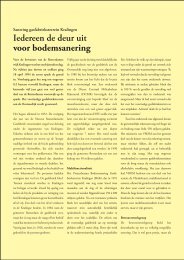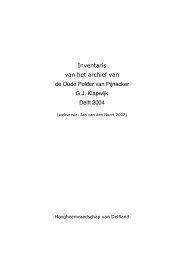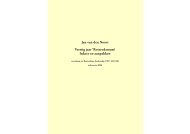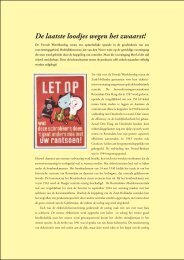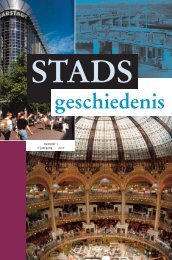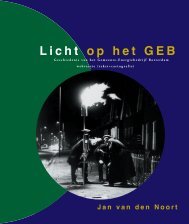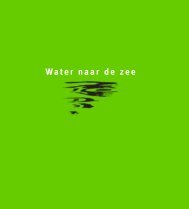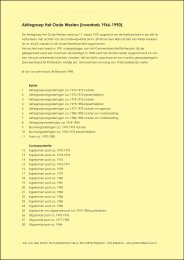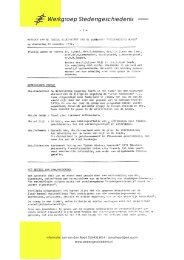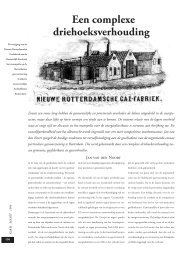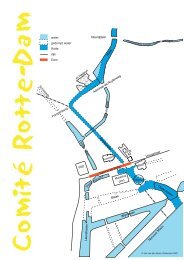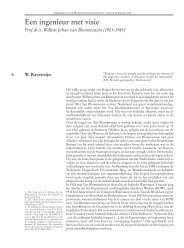Net Werk voor de Geschiedenis van Hygiene en Milieu, 1999-2001 ...
Net Werk voor de Geschiedenis van Hygiene en Milieu, 1999-2001 ...
Net Werk voor de Geschiedenis van Hygiene en Milieu, 1999-2001 ...
Create successful ePaper yourself
Turn your PDF publications into a flip-book with our unique Google optimized e-Paper software.
Dr. Christoph Bernhardt (Institut<br />
für Regional<strong>en</strong>twicklung und<br />
Strukturplanung); ‘Debates on<br />
ecological problems of river construction<br />
in a historical perspective:<br />
The case of the correction of<br />
the upper Rhine (1817-1876)’.<br />
Professor John Sheail (Institute of<br />
Terrestrial Ecology, UK); ‘UA<br />
barrage of poisonous water, the<br />
river Tees as both a political and<br />
sci<strong>en</strong>tific laboratory for the use of<br />
watercourses in inter-war Britain’.<br />
Dr. Thomas Zeller (Deutsches Museum,<br />
Münch<strong>en</strong>); ‘The River as<br />
Compromise: The Isar in Bavaria,<br />
1880-1930’.<br />
Dr. Ludy Giebels (hoogheemraadschap<br />
<strong>van</strong> Rijnland); ‘From refreshing<br />
to purifying the water.<br />
The battle against water pollution<br />
of a Dutch water board (Hoogheemraadschap<br />
<strong>van</strong> Rijnland)<br />
1900-1970’.<br />
Professor William McGuck<strong>en</strong><br />
(University of Southern Indiana);<br />
‘Lake Erie Rehabilitated: Controlling<br />
Cultural Eutrophication,<br />
1960s - 1990s.’<br />
Dr. Richard Coopey (University of<br />
Wales, Aberystwyth); ‘Engineering,<br />
Imp<strong>en</strong>alism and Political<br />
Economy: Water In Britain Since<br />
1850’.<br />
Dr. Eva Jakobsson (Royal Institute<br />
of Technology, Stockholm); ‘The<br />
History of Flowing Water Policy<br />
in Swe<strong>de</strong>n: from natural flow to<br />
industrialized rivers’.<br />
Mr. Laur<strong>en</strong>t Honnoré (University<br />
of Louvain-la-Neuve); ‘Water<br />
Supply in 19th C<strong>en</strong>tury Belgium.<br />
Evolution of municipal equipm<strong>en</strong>ts<br />
and characteristics of distribution<br />
networks’.<br />
Dr. Ir<strong>en</strong>e Maver (University of<br />
Glasgow); ‘Scottish Water: Reactions<br />
and Resistance to Municipal<br />
Control in the Mid Ninete<strong>en</strong>th<br />
C<strong>en</strong>tury’.<br />
Professor André Guillerme<br />
(CNAM, Paris); ‘Water In Northern<br />
Fr<strong>en</strong>ch Cities From Roman<br />
Empire to industrial Revolution’.<br />
Deze confer<strong>en</strong>tie moet e<strong>en</strong> vervolg<br />
krijg<strong>en</strong>. De <strong>de</strong>elnemers zijn bezig<br />
zich te organiser<strong>en</strong> als e<strong>en</strong> internationale<br />
ver<strong>en</strong>iging <strong>van</strong> water historici.<br />
Correspon<strong>de</strong>nt <strong>voor</strong> Ne<strong>de</strong>rland<br />
is dr. Ludy Giebels<br />
Nature<br />
betwe<strong>en</strong> fact and fiction<br />
An interdisciplinary symposium on<br />
nature in the cultural sci<strong>en</strong>ces 4 - 5<br />
November <strong>1999</strong> Aca<strong>de</strong>miegebouw,<br />
Broerstraat 5, Groning<strong>en</strong> Rudolf<br />
Agricola Institute University of Groning<strong>en</strong><br />
Giv<strong>en</strong> that the division betwe<strong>en</strong><br />
nature and culture is one of the<br />
fundam<strong>en</strong>tal traits of the mo<strong>de</strong>rn<br />
Western world, it might look as if<br />
nature is only marginally important<br />
17<br />
18<br />
65<br />
contactblad <strong>van</strong> <strong>de</strong><br />
stichting net werk <strong>voor</strong> <strong>de</strong><br />
980-981<br />
geschie<strong>de</strong>nis <strong>van</strong> hygiëne <strong>en</strong> milieu<br />
redactie: myriam d a r u<br />
webversie: jan <strong>van</strong> <strong>de</strong>n n o o r t<br />
to the cultural sci<strong>en</strong>ces. Nevertheless,<br />
nature crops up time and time<br />
again in any type of research on<br />
human culture (in the broa<strong>de</strong>st possible<br />
s<strong>en</strong>se of that word) - and not<br />
just as the opposite or counterpart<br />
of culture. On second thought,<br />
this should not surprise us. In the<br />
<strong>en</strong>d, the bor<strong>de</strong>rline betwe<strong>en</strong> nature<br />
and culture is a necessarily human,<br />
cultural, inv<strong>en</strong>tion. It is drawn differ<strong>en</strong>tly,<br />
appar<strong>en</strong>tly arbitrarily, in<br />
differ<strong>en</strong>t sci<strong>en</strong>tific disciplines and<br />
cultural contexts. All these bor<strong>de</strong>rlines<br />
have one thing in common,<br />
however: they make ‘nature’, in a<br />
negative or positive s<strong>en</strong>se, serve as a<br />
yardstick, as a criterion for evaluation<br />
and classification.<br />
This observation has induced wi<strong>de</strong>spread<br />
<strong>en</strong>dorsem<strong>en</strong>t of the i<strong>de</strong>a that<br />
nature is itself to a large <strong>de</strong>gree a<br />
cultural construction, and in that<br />
role a constitutive factor of the<br />
human repres<strong>en</strong>tation of nature,<br />
of our diverging conceptions of<br />
nature. For this reason, the status<br />
of nature is a crucial focal point<br />
for reflection in each and every of<br />
the cultural sci<strong>en</strong>ces: is it (and in<br />
which s<strong>en</strong>se) fact or fiction, real<br />
or a construction, autonomous or<br />
human-ma<strong>de</strong>, a mix of both, or yet<br />
something else The significance<br />
of this kind of reflection is, in addition,<br />
evi<strong>de</strong>nt in times in which<br />
<strong>en</strong>vironm<strong>en</strong>t, ecology and nature<br />
feature so promin<strong>en</strong>tly on political<br />
and social ag<strong>en</strong>das.<br />
The two-day symposium aims at<br />
providing an interdisciplinary insight<br />
into nature as a cultural (re-<br />
)construction, and into its role in<br />
the social and cultural sci<strong>en</strong>ces both<br />
as an object of sci<strong>en</strong>tific inquiry and<br />
as a guiding force. In the various<br />
sessions, promin<strong>en</strong>t repres<strong>en</strong>tatives<br />
of a broad range of cultural sci<strong>en</strong>ces<br />
will address two areas of controversy.<br />
One is that of the relation<br />
betwe<strong>en</strong> nature and other constructions:<br />
how do conceptions of nature<br />
emerge in the first place; the other<br />
that of the relation betwe<strong>en</strong> nature<br />
as a construction and as reality:<br />
how reliable or repres<strong>en</strong>tative are<br />
conceptions of nature, how do they<br />
influ<strong>en</strong>ce our behaviourAlongsi<strong>de</strong><br />
this symposium a course will be<br />
organized for Ph.D.-stu<strong>de</strong>nts (aio’s/<br />
oio’s).<br />
PROGRAMME<br />
Thursday 4 November, S<strong>en</strong>aatskamer<br />
10.00-10.30 Registration, Coffee<br />
10.30-10.40 Op<strong>en</strong>ing of the<br />
confer<strong>en</strong>ce by prof.dr. H.L.M.<br />
Hermans, Dean of the Faculty of<br />
Arts, University of Groning<strong>en</strong><br />
The literary construction of nature<br />
10.40-11.30 Axel Goodbody<br />
(University of Bath), ‘Ecocriticism/Possibilities<br />
and perspectives<br />
for an ecology-ori<strong>en</strong>ted literary<br />
critique’<br />
11.30-12.15 Bernhard Scholz (University<br />
of Groning<strong>en</strong>), ‘Sublime<br />
and beautiful nature in the geo-<br />
18<br />
19<br />
17/18<br />
<strong>Net</strong> <strong>Werk</strong> 65 - oktober <strong>1999</strong><br />
18/19



